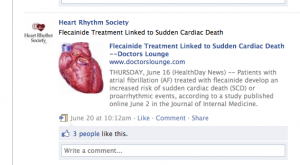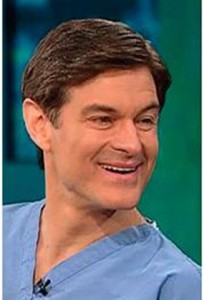July 28th, 2011 by Peggy Polaneczky, M.D. in Health Tips, Research
No Comments »

 Most women in their 40′s believe they should have annual mammograms, regardless of what screening regimen their doctor might recommend.
Most women in their 40′s believe they should have annual mammograms, regardless of what screening regimen their doctor might recommend.
So say researchers in Massachusetts who surveyed women (primarily white, highly educated) ages 39-49 presenting for annual checkups. They gave the women a fact sheet about the new USPSTF guidelines on mammogram screening in their age group, and asked them to read one of two articles either supporting or opposing the guidelines. The researchers then asked women about their beliefs, concerns and attitudes about breast cancer and mammogram screening. Here’s what they found –
- Women overwhelmingly want annual mammograms – Close to 90% of women surveyed felt they should have annual mammograms, regardless of what their doctor might recommend.
- Women overestimate breast cancer risks – Eighty eight percent overestimated their lifetime risk for the disease, with the average estimate being 37%. (The correct lifetime risk for breast cancer is 12%). This is consistent with previous research on breast cancer beliefs.
- The media may not influence women’s opinions about screening guidelines – Read more »
*This blog post was originally published at The Blog That Ate Manhattan*
July 6th, 2011 by John Mandrola, M.D. in News, Research
No Comments »

I have said that the best tool for treating atrial fibrillation (AF) is education. I still strongly believe this, perhaps more then ever.
AF presents itself to people in so many different ways–from no symptoms to incapacitation. Likewise, the treatments for AF range from simple reassurance and lifestyle changes, to taking a medicine, and on to having a complex ablation[s].
Because knowledge is so important to patients with AF, I encourage them to do outside research. This surely means going on-line. The problem, of course, comes with assessing the quality of information. It reminds me of what an old professor used to profess, “no data is better than bad data.”
What’s more, the vast diversity of AF makes comparing notes with friends problematic. One person’s wonder drug may be another’s poison.
Last week, this provocative AF headline came through on one of my Google Alert emails: 
“Flecainide Treatment Linked to Sudden Cardiac Death.” Read more »
*This blog post was originally published at Dr John M*
June 14th, 2011 by Berci in Research
No Comments »

While 23andMe brings down the price of consumer genetic tests and builds up relations with big pharma (doesn’t share individual data though), it seems the DTC genetic testing is neither accurate in predictions nor beneficial to individuals according to a study described on Medical News Today.
Working under the supervision of Associate Professor Cecile Janssens, together with researchers from Leiden, The Netherlands, and Boston, USA, Ms Kalf examined the risk predictions supplied by two large DTC companies, deCODEme (Iceland) and 23andMe (USA). They simulated genotype data for 100,000 individuals based on established genotype frequencies and then used the formulas and risk data provided by the companies to obtain predicted risks for eight common multi-factorial diseases – age-related macular degeneration (AMD), atrial fibrillation, celiac disease, Crohn’s disease, heart attack, prostate cancer, and Type 1 and Type 2 diabetes (T2D). Read more »
*This blog post was originally published at ScienceRoll*
April 12th, 2011 by Dr. Val Jones in Opinion, Quackery Exposed
55 Comments »
 When I was in medical school at Columbia University College of Physicians and Surgeons, Dr. Mehmet Oz had the reputation of being a competent and caring cardiothoracic surgeon whose research interest was reducing preoperative stress. I remember hearing about a music study of his in which soothing melodies reduced blood pressure and heart rates in patients preparing for heart surgery. I felt pleased that a surgeon was leading the charge in improving patients’ O.R. experiences, and had no inkling that 15 years later Dr. Oz would be America’s chief snake oil salesman.
When I was in medical school at Columbia University College of Physicians and Surgeons, Dr. Mehmet Oz had the reputation of being a competent and caring cardiothoracic surgeon whose research interest was reducing preoperative stress. I remember hearing about a music study of his in which soothing melodies reduced blood pressure and heart rates in patients preparing for heart surgery. I felt pleased that a surgeon was leading the charge in improving patients’ O.R. experiences, and had no inkling that 15 years later Dr. Oz would be America’s chief snake oil salesman.
I have been slow to criticize Dr. Oz on my blog because of a sense of loyalty to my medical school, however yesterday he crossed the line when things got personal – a friend of mine was negatively impacted by his misinformation to the point where her life was endangered. From watching his TV show, she was led to believe that she would put herself at risk for thyroid cancer if she got a mammogram. Several of her relatives have had breast cancer, and she should be particularly vigilant in her screening efforts. However, because Dr. Oz said that mammograms may themselves cause cancer, she opted out of appropriate screening.
My colleague Dr. David Gorski at Science Based Medicine has done an excellent job of documenting Dr. Oz’s almost Charlie Sheen-like career descent. Although he began his work as (presumably) a science-respecting surgeon, he now spends a lot of his time hosting a TV show that features faith healers, anti-vaccinationists, and psychics.
But how does the average lay person know how to evaluate Dr. Oz’s health claims? When Oprah’s network promotes him as “America’s physician” the platform itself offers him credibility, and a reach that can damage and misinform millions like my friend. I have a feeling that many of my peers at Columbia are concerned about Dr. Oz’s promotion of quackery, but once they’ve invested in his brand for so long, it’s easier to turn a blind eye to his nuttiness than to oust him from his academic positions. At what point is a celebrity doctor doing more harm than good to an institution’s reputation? Is he now “too big to fail?”
But back to my main point – dear readers if you watch Dr. Oz and think that he’s a credible source of health information, please be aware that much of what he says is inaccurate, exaggerated, and based on mystical belief systems. Please don’t act on his advice without checking with your own physician first.
Sadly, good science doesn’t always make good television. But the truth can make you well. Be warned that you are unlikely to find the truth consistently on the Dr. Oz show.
April 7th, 2011 by Shadowfax in Opinion, Quackery Exposed
2 Comments »

Going to the Huffington Post for medical information is perhaps comparable to going to Vito Corleone for advice on income tax compliance. Another prominent blogger refers to is as “that hive of scum and quackery,” a lovely and accurate epithet for a media outlet which provides refuge and cover for anti-vaccationists, homeopaths and practictioners of reiki and other such pseudoscientific twaddle. I avoid the HuffPo like the plague. But, like a moth to the flame, sometimes I can’t help myself, and when a facebook friend (and former blogger) pointed to this contrarian article, my interest was piqued and I had to check it out.
Is High Blood Pressure Overtreated? Dr. Dennis Gottfried, Associate professor, University of Connecticut Medical School
First of all, I don’t know Dr Gottfried, and I don’t want to cast aspersions on him professionally. He might be a faith healer and snake-handler, or he might be a prominent researcher and expert in the field. I have no idea, and other than his questionable judgement in being affiliated with the HuffPo, I don’t want to make any judgement on him as a physician or a scientist. Read more »
*This blog post was originally published at Movin' Meat*
 Most women in their 40′s believe they should have annual mammograms, regardless of what screening regimen their doctor might recommend.
Most women in their 40′s believe they should have annual mammograms, regardless of what screening regimen their doctor might recommend.





 When I was in medical school at
When I was in medical school at 








